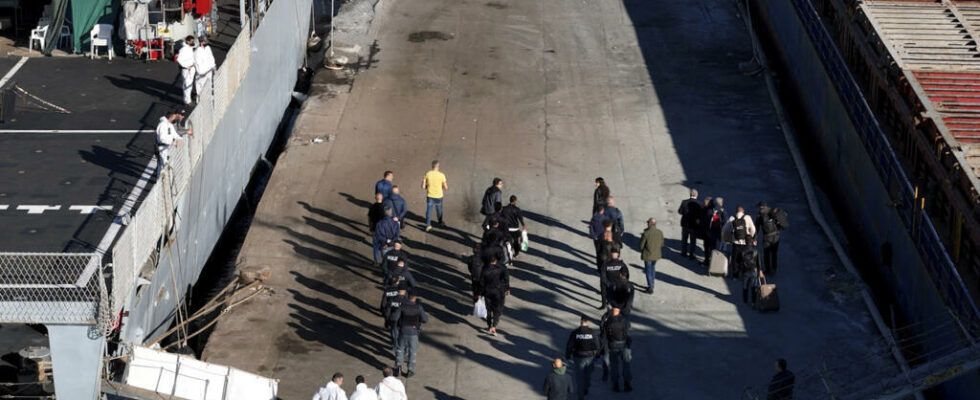This Monday, November 11, a court in Rome inflicted a new setback on Giorgia Meloni’s migration policy by asking European justice to rule on the retention of migrants transferred to Albania, who, in the meantime, will return to Italy.
3 mins
The magistrates decided to refer the matter to the Court of Justice of the European Union (CJEU) to ensure that Italian legislation complies with European texts. For reasons of legal deadline, the seven migrants concerned – of Egyptian and Bangladeshi nationality – “ will return to Italy in the next few hours “, an Italian government source told AFP.
Deputy Prime Minister Matteo Salvini, an ally of Meloni and leader of the anti-migrant League party, immediately reacted to this decision by denouncing “ a new political judgment (…) against the Italians and their security “. “ The government and Parliament have the right to react to protect citizens and they will do so “. “ Justice once again dismantles the propaganda of the Italian government », welcomed the NGO sea rescue of migrants Sea-Watch. “ How much longer will the Italian government continue this inhumane farce? »
While Rome has already spent tens of millions of euros to build these detention centers in Albania having finally opened in October months late, this new setback is embarrassing for Giorgia Meloni. The leader of the post-fascist party Fratelli d’Italia presented this project as a ” example » for other European countries. These centers, initially planned to accommodate hundreds of migrants, are currently condemned to running empty.
“Safe” countries?
In a previous case dating back three weeks, judges from the migration affairs section of the Rome court had canceled the detention of the first twelve migrants taken to Albaniainvoking a recent judgment of the CJEU on countries of origin considered “safe” by host countries. The court ruled that under the terms of this judgment, the twelve migrants did not meet the criteria for detention in Albania and that they should be returned to Italy. While European law takes precedence over national law, Italian judges invoked this decision stipulating that member states can only designate entire countries as “safe”, and not certain regions of these countries.
To get around the obstacle, the government of Giorgia Meloni adopted a decree 48 hours later by including in the law 19 countries considered “safe” by the government. Which means that Rome hoped to process asylum requests from migrants from these countries using an accelerated procedure from Albania, with probable expulsion at stake.
Faced with this decree, judges from the Bologna court already addressed the CJEU two weeks ago, asking it to clarify the situation in the face of “ obvious discrepancies » and « conflicts of interpretation » in the Italian legal system. They also felt that it was not possible to declare entire countries safe when there was evidence of the persecution of minorities. “ It could be said, paradoxically, that Nazi Germany was an extremely safe country for the vast majority of the German population: with the exception of Jews, homosexuals, political opponents, people of Roma origin and other groups minority “, they pleaded.
Signed at the end of 2023 by Ms. Meloni and her Albanian counterpart, Edi Rama, the agreement between Rome and Tirana has a duration of five years and concerns adult men intercepted by the Italian navy or coast guard in their search and rescue zone. rescue in international waters. According to figures from the Ministry of the Interior, 58,504 migrants arrived in Italy between January 1 and November 11, 2024, compared to 146,868 over the same period in 2023.
